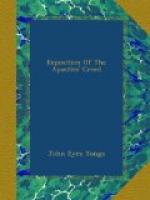It is especially objected that there is no reference in this Creed to the atoning work of the Lord Jesus Christ. But, though not directly expressed, this doctrine is really and substantially contained in it. The Creed is the confession of those whose bond of union is common faith in the Lord Jesus Christ as their Saviour. The articles which treat of Him and of His sufferings and work are intelligible only to those who believe in the reality and efficacy of the Atonement.
The Creed contains twelve articles, and to each of these, and to every part of it, the words “I believe” belong. One article relates to God the Father, six to God the Son, one to God the Holy Ghost, and four to the Holy Catholic Church and the privileges secured to its members. These articles are—
1. I believe in God the
Father Almighty, Maker of heaven and
earth.
2. And in Jesus Christ His only Son our Lord,
3. Who was conceived by the Holy Ghost, born of the Virgin Mary,
4. Suffered under Pontius
Pilate, was crucified, dead, and
buried,
5. He descended into
hell; the third day He rose again from the
dead,
6. He ascended into heaven,
and sitteth on the right hand of God
the
Father Almighty;
7. From thence He shall come to judge the quick and the dead.
8. I believe in the Holy Ghost,
9. The Holy Catholic Church; the Communion of saints;
10. The Forgiveness of sins;
11. The Resurrection of the body,
12. And the Life Everlasting.
In estimating the value of creeds in the early ages of the Christian Church, it is important to bear in mind that the converts were almost wholly dependent on oral instruction for their knowledge of Divine truth. Copies of the Old and New Testaments existed in manuscript only. These were few in number, and the cost of production placed them beyond the reach of the great majority. A single copy served for a community or a district in which the Hebrew or the Greek tongue was understood, but in localities where other languages were in use the living voice was needed to make revelation known. It is only since the invention of printing and the application of the steam-engine to the economical and rapid production of books, and since modern linguists have multiplied the translations of the Bible, that it has become in their own tongues accessible to believers in all lands, available for private perusal and family reading. It was therefore a necessity that Christians should possess “a form of sound words,” comprehensive enough to embody the leading doctrines of Christianity, yet brief enough to be easily committed to memory.
* * * * *
ARTICLE 1
1. I believe in God the Father Almighty, Maker of heaven and earth




